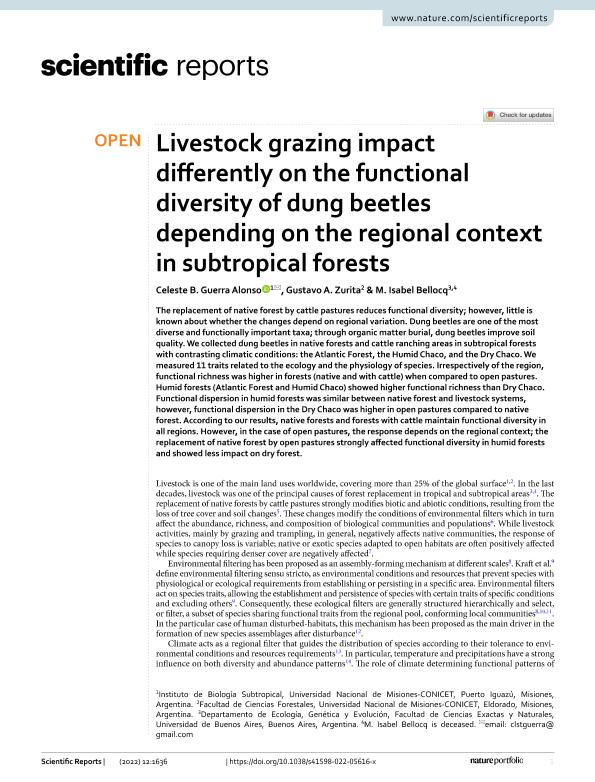Mostrar el registro sencillo del ítem
dc.contributor.author
Guerra Alonso, Celeste Beatriz

dc.contributor.author
Zurita, Gustavo Andres

dc.contributor.author
Bellocq, Maria Isabel

dc.date.available
2023-09-27T14:53:42Z
dc.date.issued
2022-01
dc.identifier.citation
Guerra Alonso, Celeste Beatriz; Zurita, Gustavo Andres; Bellocq, Maria Isabel; Livestock grazing impact differently on the functional diversity of dung beetles depending on the regional context in subtropical forests; Nature Publishing Group; Scientific Reports; 12; 1; 1-2022; 1-11
dc.identifier.uri
http://hdl.handle.net/11336/213238
dc.description.abstract
The replacement of native forest by cattle pastures reduces functional diversity; however, little is known about whether the changes depend on regional variation. Dung beetles are one of the most diverse and functionally important taxa; through organic matter burial, dung beetles improve soil quality. We collected dung beetles in native forests and cattle ranching areas in subtropical forests with contrasting climatic conditions: the Atlantic Forest, the Humid Chaco, and the Dry Chaco. We measured 11 traits related to the ecology and the physiology of species. Irrespectively of the region, functional richness was higher in forests (native and with cattle) when compared to open pastures. Humid forests (Atlantic Forest and Humid Chaco) showed higher functional richness than Dry Chaco. Functional dispersion in humid forests was similar between native forest and livestock systems, however, functional dispersion in the Dry Chaco was higher in open pastures compared to native forest. According to our results, native forests and forests with cattle maintain functional diversity in all regions. However, in the case of open pastures, the response depends on the regional context; the replacement of native forest by open pastures strongly affected functional diversity in humid forests and showed less impact on dry forest.
dc.format
application/pdf
dc.language.iso
eng
dc.publisher
Nature Publishing Group

dc.rights
info:eu-repo/semantics/openAccess
dc.rights.uri
https://creativecommons.org/licenses/by/2.5/ar/
dc.subject
Subtropical forests
dc.subject.classification
Conservación de la Biodiversidad

dc.subject.classification
Ciencias Biológicas

dc.subject.classification
CIENCIAS NATURALES Y EXACTAS

dc.title
Livestock grazing impact differently on the functional diversity of dung beetles depending on the regional context in subtropical forests
dc.type
info:eu-repo/semantics/article
dc.type
info:ar-repo/semantics/artículo
dc.type
info:eu-repo/semantics/publishedVersion
dc.date.updated
2023-07-07T22:03:54Z
dc.identifier.eissn
2045-2322
dc.journal.volume
12
dc.journal.number
1
dc.journal.pagination
1-11
dc.journal.pais
Reino Unido

dc.journal.ciudad
Londres
dc.description.fil
Fil: Guerra Alonso, Celeste Beatriz. Consejo Nacional de Investigaciones Científicas y Técnicas. Centro Científico Tecnológico Conicet - Nordeste. Instituto de Biología Subtropical. Instituto de Biología Subtropical - Nodo Puerto Iguazú | Universidad Nacional de Misiones. Instituto de Biología Subtropical. Instituto de Biología Subtropical - Nodo Puerto Iguazú; Argentina
dc.description.fil
Fil: Zurita, Gustavo Andres. Universidad Nacional de Misiones. Facultad de Ciencias Forestales; Argentina. Consejo Nacional de Investigaciones Científicas y Técnicas. Centro Científico Tecnológico Conicet - Nordeste. Instituto de Biología Subtropical. Instituto de Biología Subtropical - Nodo Puerto Iguazú | Universidad Nacional de Misiones. Instituto de Biología Subtropical. Instituto de Biología Subtropical - Nodo Puerto Iguazú; Argentina
dc.description.fil
Fil: Bellocq, Maria Isabel. Universidad de Buenos Aires. Facultad de Ciencias Exactas y Naturales. Departamento de Ecología, Genética y Evolución; Argentina. Consejo Nacional de Investigaciones Científicas y Técnicas. Oficina de Coordinación Administrativa Ciudad Universitaria. Instituto de Ecología, Genética y Evolución de Buenos Aires. Universidad de Buenos Aires. Facultad de Ciencias Exactas y Naturales. Instituto de Ecología, Genética y Evolución de Buenos Aires; Argentina
dc.journal.title
Scientific Reports
dc.relation.alternativeid
info:eu-repo/semantics/altIdentifier/url/https://www.nature.com/articles/s41598-022-05616-x
dc.relation.alternativeid
info:eu-repo/semantics/altIdentifier/doi/http://dx.doi.org/10.1038/s41598-022-05616-x
Archivos asociados
